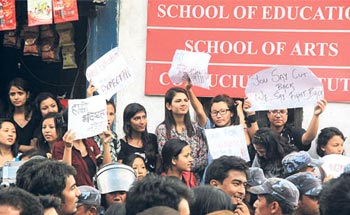Students protest against discrepancies in GPA

Students from affiliated colleges under Kathmandu University School of Management (KUSOM) staged a sit-in at the KUSOM premises at Balkumari in Lalitpur on September 13 with five demands concerning the trend of the fluctuations in the results of KU’s Bachelors of Business Administration (BBA), Bachelors in Business Information Systems (BBIS)and Bachelors in Hospitality and Tourism Management (BHTM) as well as the discrepancies in the grading system between KU constituent college and affiliated colleges.
Students from Kathmandu College of Management (KCM), Little Angels’ College of Management (LACM), and National College of Management (NCM) have reported a drastic fall in their end-semester Grade Point Average (GPA) despite having performed well during the semester and the examinations. This trend, the students say, has been seen since 2010.
“A student from our college who performs well and even scored a 3.94 in the last semester got 2.92 this semester,” reports Shailesh (names have been changed for privacy reasons), a student in his 4th year at KCM.
This is not just a one-person case, as the overall results have been shocking for students semester after semester.
“We know how well or how badly we’ve done during our exams, but the results have been discouraging. We haven’t received the grades that we know we deserve,” Shailesh further says.
Rita, a student from NCM who is in her 4th year, has faced similar situations. “I have also seen drops in my GPA even when I’ve prepared well for my exams and done my best,” says she. “For us management students, a minimum Cumulative GPA of 3.0 is required when we apply for jobs. A decline in the GPA would obviously affect our future adversely,” Rita pours out her frustration.
Another student from the same year at NCM, Kiran, sees a defect in the system.
“Even when examinations have been good, there have been cases where not even one student gets a GPA about 3.0 in one batch,” says he who is also one of the top performers in his college. “We study hard, do well in the internals and even our send-up exam results are strong. But when it comes to the final Boards, set and regulated by KU, the results are unexpected. Someone who deserves an A gets a C,” Kiran adds.
Apart from the justification of the GPA decrease, the protest was led because of other reasons as well. There is dissimilarity between the percentage of internal assessments between KUSOM and other affiliated colleges. While students from the constituent college are given 50% internal marks, students from the affiliated institutions only receive 25%.
Students have raised their voice against this discrimination while also demanding for the provision of re-checking of papers, the setting and assessment of examination papers in unbiased manner through an external body, and the abolition of the deviation rule whereby the internal marks of students are nullified if a more than 25% difference is seen between the internal marks and the marks achieved by the student in the examinations.
“A huge difference has been seen between the internal marks sent in by colleges and the student’s exam performance. Some colleges carelessly sent in highly inflated marks due to which we had to bring out the issue of a rectifying system. Consequently, other colleges which carefully sent in their evaluations also suffered,” Professor Dr Suresh Raj Sharma, Vice-Chancellor of Kathmandu University explains.
“We have qualified fulltime staffs in the University who conduct the assessments. But not all colleges have qualified and full-time teaching faculty which can do careful evaluations. So until this is made to change, the Academic Council has decided not to let the respective colleges control the internal marks, and has given the right to send 25% internal marks,” says Sharma who also shares that the University is now rethinking about this provision.
“We’ve been forming committees, writing letters and submitting applications for the past two years and nothing has come out of it. Therefore, we decided to take this issue to the streets,” says Shailesh.
“Even during our protest, the authorities weren’t willing to address our issues. Only after a couple of hours did they finally respond to us and gave us their word to look into our demands,” shares Rita.
The students also have shared that they felt a bias against the affiliated colleges.
Bhuvan, studying in the 3rd year in KUSOM, says, “It looks like students from our colleges have done relatively well when we look at the recent results. However, even in our college, students have complained that they haven’t been receiving the grades they expect. However, this is not to say that there’s been favoritism.”
“We don’t award scores by keeping a particular college in mind. The results depend on factors, including the commitment shown by teachers and the quality of the students. We make sure that the assessment for everyone is fair and just. Had it not been, we ourselves would change it,” adds Professor Sharma.
The students have forwarded an ultimatum to KUSOM until September 19 to address these issues. “We’re waiting for September 19,” says Shailesh, determined to resolve this issue this time around.
“Students have been demoralized by this trend. If we don’t get the reward that our efforts deserve, then the students will start compromising on their efforts,” adds Shailesh.
Given that there may be some students who are getting low grades due to their own insincerity and lack of preparation, Shailesh, however, opines that overall, the weighing scales are tilted against the weakness of the evaluating system.
source: republica,18 Sept 2012
photo courtery:republica
Posted on: 2012-09-18































